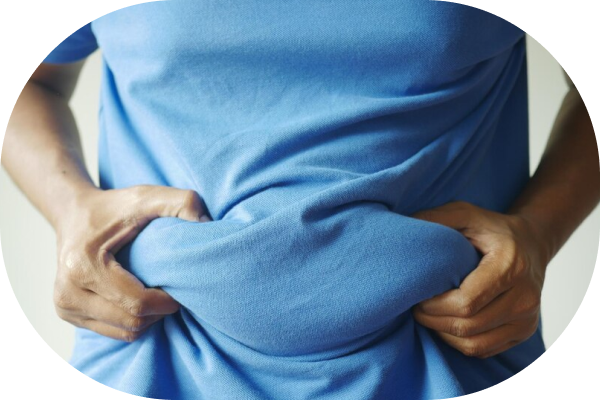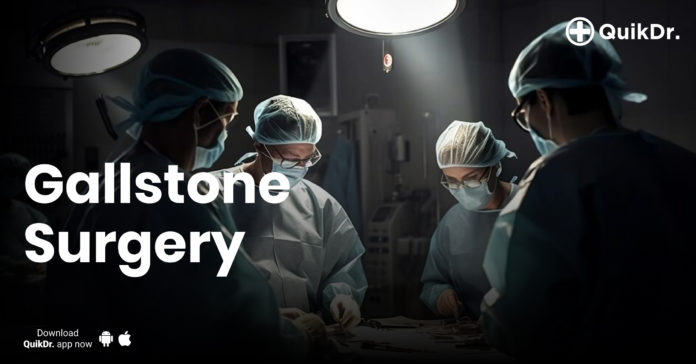Gallbladder stones, can be silent or, in the event that they become lodged, excruciatingly painful. To properly treat the disease, our gallstone specialists in Kochi perform cholecystectomy, or gallstone surgery. Choose between open and laparoscopic gallstone treatment methods by consulting with the top gallstone surgeons.
What is Gallstone surgery
Surgery for gallstones is a prevalent approach to address symptoms caused by obstructive or recurrent gallstones. Laparoscopic surgery is more frequently employed compared to open surgery.
If issues arise due to gallstones or other gallbladder diseases, surgeons might perform a cholecystectomy, which involves removing the gallbladder. This can be done through either laparoscopic (‘keyhole’) cholecystectomy or open surgery. As the gallbladder is not a vital organ, the body can function well without it.

Factors That Affect Gallstones Surgery Cost
The overall expense for gallstone surgery can fluctuate significantly due to various factors, such as the consultation and operating fees charged by the surgeon, the quantity and size of gallstones, the expenses associated with preoperative diagnostic tests, the chosen surgical technique, and the preference for a government or private hospital, along with any incurred hospital bed charges.
Symptoms of gallstones
- Abdominal discomfort persisting for multiple hours
- Accompanied by feelings of nausea and vomiting
- The presence of a fever (even if it’s low-grade) or chills
- A yellowish tint in the skin or whites of the eyes (known as jaundice)
- Urine with a tea-colored appearance along with light-colored stools.

Types of gallstones
1.Cholesterol
2.Calcium bilirubinate
Gallstone formation occurs when the concentrations of these substances exceed their solubility in the bile.When supersaturated these substances precipitate from the solution as microscopic crystals. These microscopic crystals are trapped in the gallbladder mucus.It produce gallbladder sludge.Overtime, crystals grow ,aggregate and fuse to form macroscopic stones.Occlusion of the ducts by sludge or stones.It produce complications of gallstone disease.
1.Cholesterol gallstones:More than 80% of gallstones contain cholesterol as their major component.Amount of free cholesterol molecules is higher within the gallbladder.In the gallbladder reabsorption of water and electrolytes concentrate to form bile.
Major factors that determine the formation of cholesterol stones
1.The amount of cholesterol secreted by the liver cells, relative to lecithin and bile salts.
2.The degree of concentration and the extent of stasis of bile within the gallbladder.
Causes of Cholesterol Gallstone
Cholesterol gallstone
1.Obesity: Obesity is associated with metabolic syndrome, insulin resistance, hyperlipidemia and type II diabetes .
2.Multiple pregnancies: Major contributing factor is the high progesterone levels during pregnancy.
3.Other causes of gallbladder stasis: Spinal cord injuries reduces gallbladder contractility.
Rapid weight loss associated with severe caloric and fat restriction.
4.Medications:Estrogen increases biliary excretion of cholesterol. Fibrates increase biliary excretion of cholesterol. Somatostatin analogues decrease gallbladder emptying.
5.Genetics:Associated with gallstones in 25% of patients.

Calcium Bilirubinate
A gallstone known as a calcium bilirubinate or pigment stone is primarily composed of bilirubin, a yellow pigment formed during the breakdown of red blood cells.Earthy brown stones, predominantly developing in the bile ducts, consist mainly of calcium bilirubinate and calcium palmitate. These elements result from the hydrolysis, facilitated by enzymes in infecting bacteria, of conjugated bilirubin and lecithin, respectively.
Other causes of gallstone disease
- Crohn’s disease and ileal resection
- Burns
- Paralysis
- Prolonged ICU care
- Major trauma
Gallstone Treatment
The majority of individuals with asymptomatic gallstones typically won’t require treatment. The decision for gallstone treatment is contingent on your symptoms and the findings of diagnostic tests, as determined by your doctor.
Your healthcare provider might advise staying vigilant for signs of gallstone complications, such as escalating pain in the upper right abdomen. If symptoms of gallstones manifest in the future, treatment can be considered. Treatment options for gallstones comprise:
- Surgery for Gallbladder Removal (Cholecystectomy): Your doctor might recommend the surgical removal of your gallbladder, known as cholecystectomy, as gallstones often recur. Following gallbladder removal, bile is directed straight from the liver into the small intestine, bypassing the gallbladder. Although living without a gallbladder is feasible and doesn’t impact food digestion, it can lead to temporary diarrhea.
- Medications for Gallstone Dissolution: Oral medications may be prescribed to help dissolve gallstones. However, this approach may necessitate months or even years of treatment, and gallstones are likely to redevelop if the treatment is discontinued.
- Caution Regarding Medications: Medications to dissolve gallstones are not widely used and are typically reserved for individuals unable to undergo surgery.






